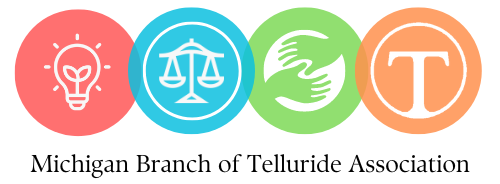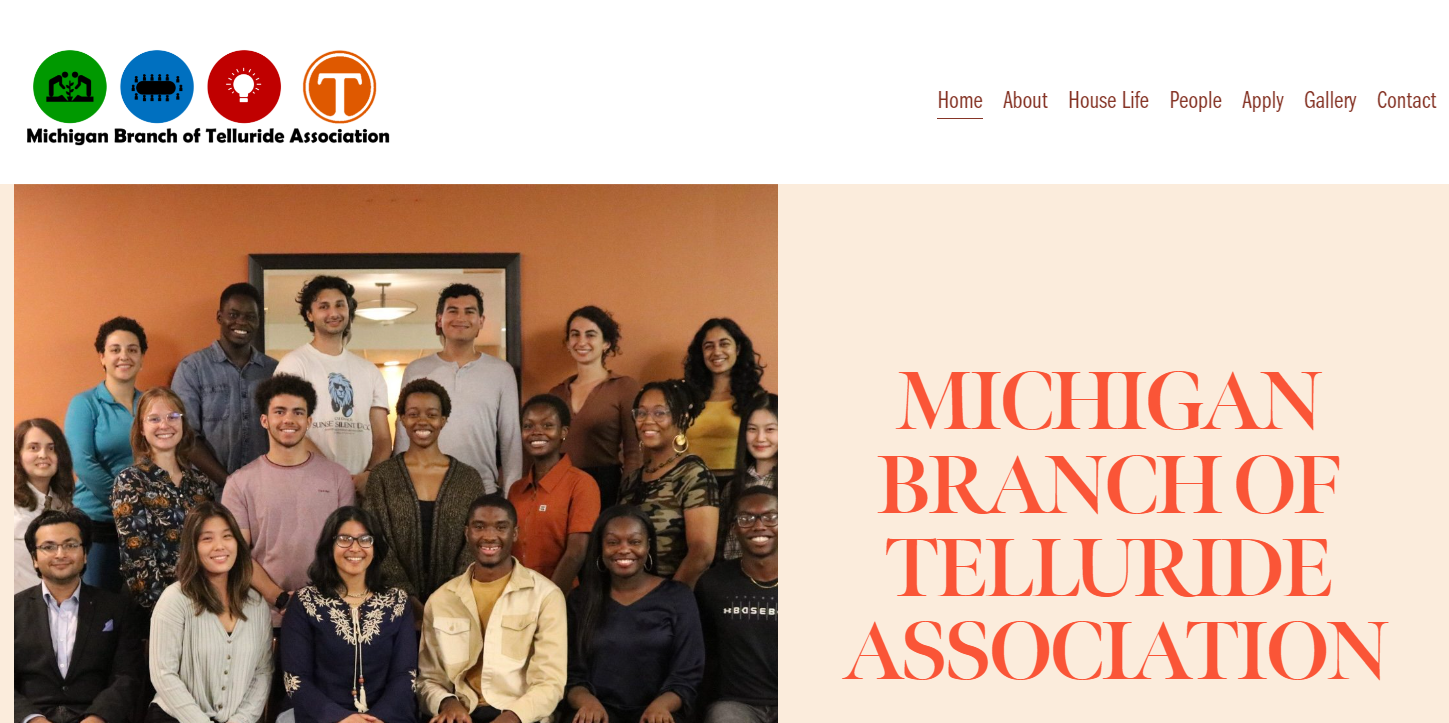Telluride Association
Founded in 1911 by Lucien L. Nunn, Telluride Association is a nonprofit organization that creates and fosters educational communities that rely upon democratic participation.
-
The purpose of Telluride Association is to promote the highest good by educating promising individuals to serve thoughtfully in the world. Since how best to serve the highest good is a question continually renewed by changing circumstances and problems, the education the Association offers is essentially ethical: it prepares those who receive it to make, on their own and with others, decisions about how to discharge their obligations to humanity, as well as developing in them the skills, knowledge, and strength of character necessary to carry those decisions out.
We attempt to fulfill this purpose through intense experiential-education programs grounded in intellectual inquiry, democratic self-government, and meaningful work. Membership in the Telluride Association is itself one of these programs. They are offered at no cost, without regard to need, in order to stimulate the interest of individuals from all circumstances, to relieve financial burdens so that all participants may contribute and benefit fully, and to encourage participants to view any moral obligation for the opportunity they have received as dischargeable through service in the world. Although content and structure vary across our programs, all share three qualities: they require a high degree of reflection and self-criticism, at both the individual and communal levels; they place special emphasis on community, rhetoric, and debate, both in order to teach participants to respect and engage those who disagree with or differ from them, and in order to train them to value finding truth and reaching actionable agreements above winning arguments; and they put their participants in positions of responsibility on the basis of demonstrated potential rather than prior knowledge or experience, in a manner designed to promote each participant’s personal development.
Thus, while the programs are independent, they are interlinked, and we value possible trajectories through them for the ways they deepen the education from each. Indeed, since one of the lessons in responsibility we impart is that the recipients of benefits such as the education we offer are obliged to pass similar benefits on to others, those in the later stages of such trajectories are often involved in administering programs at the earlier stages. Empowering program participants in this way sometimes exposes our programs to inefficiency or even failure; while we anticipate and attempt to mitigate these negative outcomes, when they occur we embrace them as a necessary part of our experiential educational model, which would not function without real consequences.
Because we believe service poses intellectual problems worthy of sustained consideration, an important aspect of the promise we look for in our program participants is a combination of intellectual curiosity and the willingness and desire to think rigorously and creatively. As a way of maximizing our contribution to the highest good, we select participants not only on the basis of their promise, but also based on the likelihood that the benefits we provide will be a decisive factor in their fulfilling that promise. Additionally, we select participants with the goal of ensuring that our educational communities will be diverse along many axes. We do this both because we see the expansion of educational opportunities as a way of serving the highest good, and because a rich variety of experiences and perspectives is a necessary condition for the kind of education we provide, which aims to awaken its recipients to claims and needs far beyond their personal ones, or the ones a given social or political setting may have brought them to consider.
-
The Telluride Association Summer Seminar (TASS) is a free, six-week summer educational experience for high school sophomores and juniors. TASS prepares and inspires promising young students to lead and serve through transformative educational experiences rooted in critical thinking and democratic community. Telluride Association covers all program costs for every student, including tuition, books, room and board, field trips, and facilities fees.
TASS applications are open to all high school sophomores and juniors (“rising juniors” and “rising seniors”). Both US and international students are welcome to apply.
Learn more about TASS here.
-
Mike Yarrow Adventurous Education Award - up to $3,000 awarded to support is a non-paying, public service activity during the summer that is outside of an academic institution and clearly reflects Mike Yarrow's interests in peace and service to humanity.
Nunn Archive Fellowship - Awarded to a student undertaking research on L.L. Nunn and Telluridean pursuits.
Mansfield-Wefald Senior Thesis Prize - $500 awarded for the best scholarly thesis written by a Telluride associate who will have completed his or her final year of undergraduate education in the 2013-14 academic year.
-
The Michigan Branch Telluride House is resolutely committed to the values of diversity and inclusion. We believe that these values are key components for fulfilling our core pillars of intellectual inquiry, democratic self-governance, and community service.
We define diversity as including, but not limited to, individual and group differences based on age, gender, gender identity and/or expression, sexual orientation, race, ethnicity, nationality, ability, religion, political ideology, socio-economic status, and intellectual and academic interests.
We recognize that inclusion is an intentional and continuous process of creating an environment in which each member is welcomed, supported, and, consequently, able to engage the house’s mission at their highest potential.
Therefore, we are collectively and individually committed to:
Actively recruiting and building a community whose members have diverse backgrounds and lives
Celebrating the richness that these diverse backgrounds and life experiences add to our communal life
Constructing an inclusive space for housemembers to engage with diverse identities
Educating ourselves on historic and contemporary disadvantages experienced by socially, politically, or economically marginalized social
Challenging these forms of marginalization within our own
Continuously assessing and improving the inclusivity of residential life
With the above points in mind:
MBTA tasks the Advisory Committee with assessing diversity and inclusion at mid- and end-of-year evaluations.
MBTA further tasks the Orientation Committee with organizing and facilitating a diversity and inclusion training each year.
MBTA recognizes that affirming and upholding diversity and inclusivity is the responsibility of every individual, committee, and elected officer of the house.




